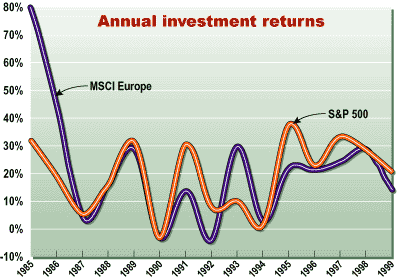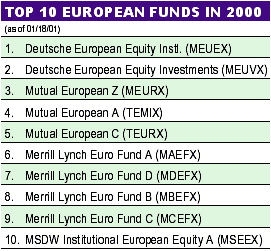
HOT TOPICS LIST
- Strategies
- Stocks
- Buy
- Investing
- Brokers
- Psychology
- Interviews
- Accumulate
- Sell
- Hold
- Spotlight
- Websites
- Candlestick Corner
- Gold & Metals
- Options Trading
LIST OF TOPICS
MUTUAL FUNDS
Mais Oui! Investing In European Funds
03/01/01 03:15:21 PM PSTby Jayanthi Gopalakrishnan
With the US markets expected to grow at a relatively slow pace, perhaps you should consider investing overseas.
| Diversify, diversify, and diversify. How often have we heard that? Add "among noncorrelated asset classes," and you would have the perfect portfolio -- at least, that's what we're told. Well, there may be some truth to that. With the US markets expected to grow slower in 2001, are there better opportunities elsewhere? The US economy, long considered an economic giant, usually clears the path for the performance of the rest of the world. If the US economy slows, so will the rest of the world. If this is the case, then what is the point of investing in other countries? DIVERSIFICATION Over the long term, a portfolio fully invested in US stocks could mean that you miss out on opportunities taking place elsewhere. After all, US stocks make up less than half the capitalization of the global market. Various studies have shown that US investors could enhance their risk-return tradeoff by diversifying into foreign equity markets. The main reason for this is the low correlation among US and foreign stocks, although some would argue that of late the correlation has been relatively high. If you look at the annual investment returns of the Morgan Stanley Capital Index Europe (MSCI Europe) versus that of the Standard & Poor's 500 index in Figure 1, you will notice that there are periods when the two are not correlated and some when they are. As a good example, between 1992 and 1994, the MSCI Europe outperformed the S&P 500 index. If you had a portion of your portfolio in European funds during that time, the volatility of your investment portfolio would have been reduced and it wouldn't have suffered as much of a downturn as it would have had you been fully invested in US domestic stocks.
Although investing globally would diversify your portfolio, hence reducing risk, there are additional risks you would be exposing yourself to. These include political and economic risks, regulatory risks, and currency risks. Currency movements are an issue in global investing because a declining currency could inadvertently decrease the value of your entire portfolio. For example, a dollar-denominated mutual fund that was invested in a region where the currency is declining against the US dollar will end up with a lower return. Because of circumstances like these, in many cases, fund managers hedge their portfolios to eliminate currency volatility. WHY EUROPE? According to a forecasters' poll conducted by The Economist, estimates for US growth in 2001 were lowered from 3.0% in December to 2.3% in January. This expected slowdown in the US economy in effect decreased the prospects of growth in other areas. Meanwhile, the 11 European nations utilizing the euro currency are expected to grow at a slightly higher pace of 2.7%. From most reports, European policymakers feel this rate may be too pessimistic. They feel that the euro-zone will not be affected by the US slowdown, and instead, they expect satisfactory growth in 2001. Strong domestic demand, together with declining oil prices and tax cuts in some countries, protects Europe during a US slowdown. The tax cuts will increase household incomes, and because of declining oil prices, you can expect only mild inflation. The euro-zone consumer price inflation fell sharply in December 2000 from the previous month, mainly due to declining energy prices. However, there are conflicting views on this outlook. Because of the strong growth in the US, European corporations had invested substantial amounts of capital in the US economy. But with the US slowdown, the euro has appreciated against the dollar, and if it stabilizes, it could mean that capital will stay within Europe. The negative ramifications of this are that European companies may find it difficult to export their products to the US. In spite of the contradictory views, the general consensus is that the euro-zone will achieve a growth rate of about 2.5%, which is not too far from that projected by The Economist poll. With this kind of economic environment, it wouldn't hurt to have a portion of your investments in European funds so you can take advantage of growth when it occurs. THE EURO The euro was established in the hope of lowering related currency costs, improving stock performance, and increasing capital within the euro-zone. Since its introduction, however, the currency's performance has been nothing but an embarrassment. Despite all that, with the recent decline of the US economy, the euro has shown signs of appreciation, a positive indication. The currency is expected to continue strengthening, and this in turn has made US corporations more optimistic. This comes as a relief, since the first signs of a declining domestic market were due to earnings warnings from the companies involved in the personal-computer industry that were experiencing marked declines in European sales. Analysts are expecting stronger growth in the European nations in 2001, partly due to the fact that the threatening slowdown in the US may not be as bad as expected. EUROPEAN MUTUAL FUNDS If you were considering investing in Europe, your best bet would be to invest a small portion of your capital -- say, 10-20% -- in mutual funds with a European focus. Figure 2 shows the top 10 European funds listed by Morningstar, Inc., based on the returns of the year 2000. By investing in mutual funds, you will be diversifying that portion of your portfolio among various industry sectors. The gains of diversifying among countries as well as sectors within those countries will further enhance your returns.
CONCLUSION Spreading out your investments among various nations is always a good idea. Although investing in foreign funds can be intimidating, concentrating a percentage of your investments in certain markets will improve the performance of your portfolio and reduce your overall risks. With the euro-zone markets expected to grow a little faster than the US markets in 2001, it may be worth your while to consider investing a small portion of your assets in European funds. Technical Editor Jayanthi Gopalakrishnan can be reached at Jayanthi@Traders.com. |
Staff Writer
| Title: | Staff Writer |
| Company: | Technical Analysis, Inc. |
| Address: | 4757 California Ave SW |
| Seattle, WA 98116 | |
| Phone # for sales: | 206 938 0570 |
| Fax: | 206 938 1307 |
| Website: | working-money.com |
| E-mail address: | Jayanthi@traders.com |
Traders' Resource Links | |
| Charting the Stock Market: The Wyckoff Method -- Books | |
| Working-Money.com -- Online Trading Services | |
| Traders.com Advantage -- Online Trading Services | |
| Technical Analysis of Stocks & Commodities -- Publications and Newsletters | |
| Working Money, at Working-Money.com -- Publications and Newsletters | |
| Traders.com Advantage -- Publications and Newsletters | |
| Professional Traders Starter Kit -- Software | |
PRINT THIS ARTICLE

Request Information From Our Sponsors
- StockCharts.com, Inc.
- Candle Patterns
- Candlestick Charting Explained
- Intermarket Technical Analysis
- John Murphy on Chart Analysis
- John Murphy's Chart Pattern Recognition
- John Murphy's Market Message
- MurphyExplainsMarketAnalysis-Intermarket Analysis
- MurphyExplainsMarketAnalysis-Visual Analysis
- StockCharts.com
- Technical Analysis of the Financial Markets
- The Visual Investor
- VectorVest, Inc.
- Executive Premier Workshop
- One-Day Options Course
- OptionsPro
- Retirement Income Workshop
- Sure-Fire Trading Systems (VectorVest, Inc.)
- Trading as a Business Workshop
- VectorVest 7 EOD
- VectorVest 7 RealTime/IntraDay
- VectorVest AutoTester
- VectorVest Educational Services
- VectorVest OnLine
- VectorVest Options Analyzer
- VectorVest ProGraphics v6.0
- VectorVest ProTrader 7
- VectorVest RealTime Derby Tool
- VectorVest Simulator
- VectorVest Variator
- VectorVest Watchdog


